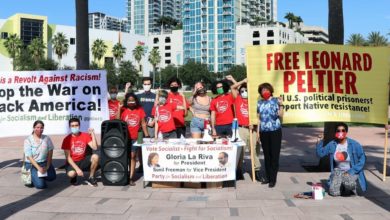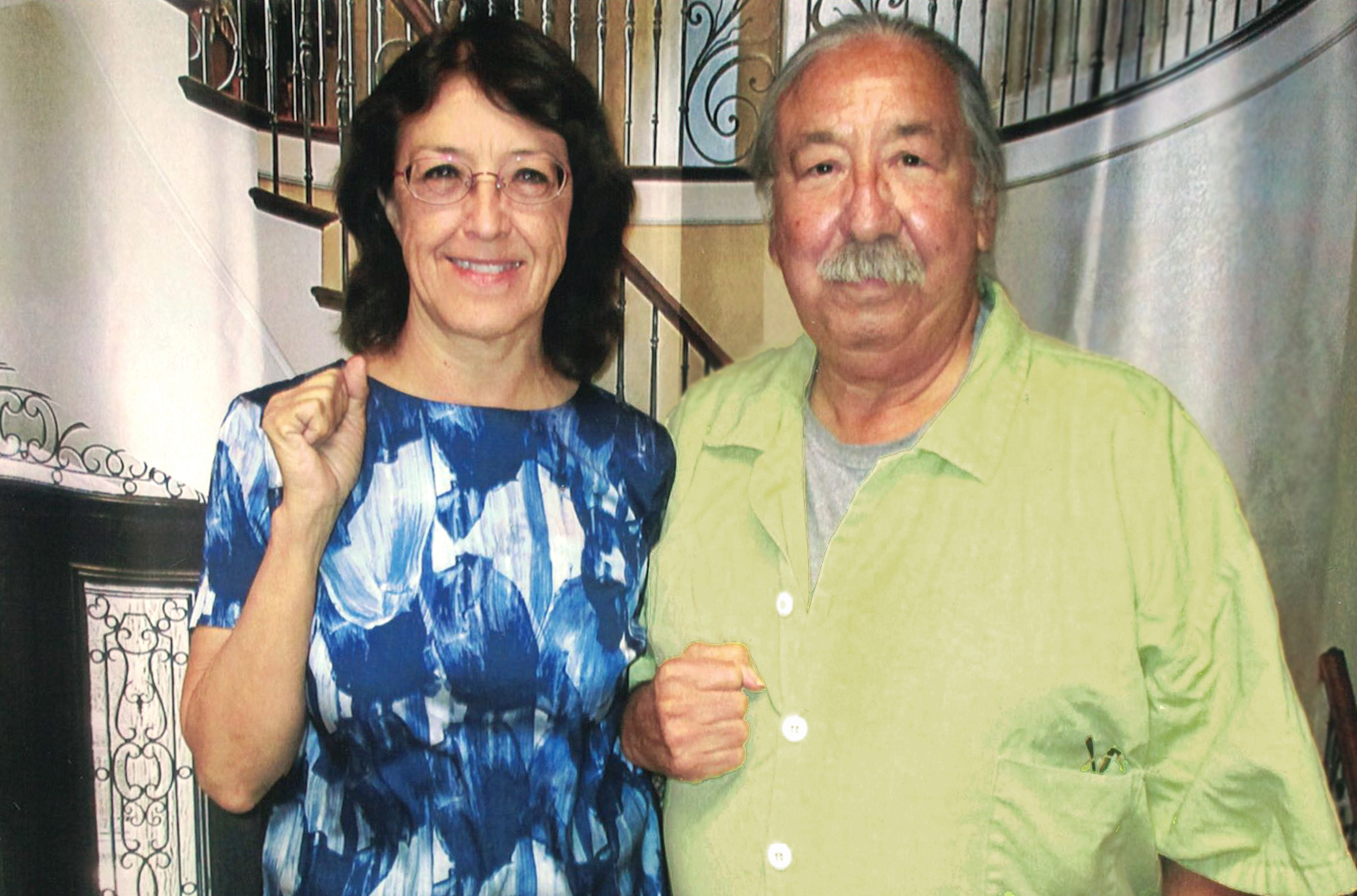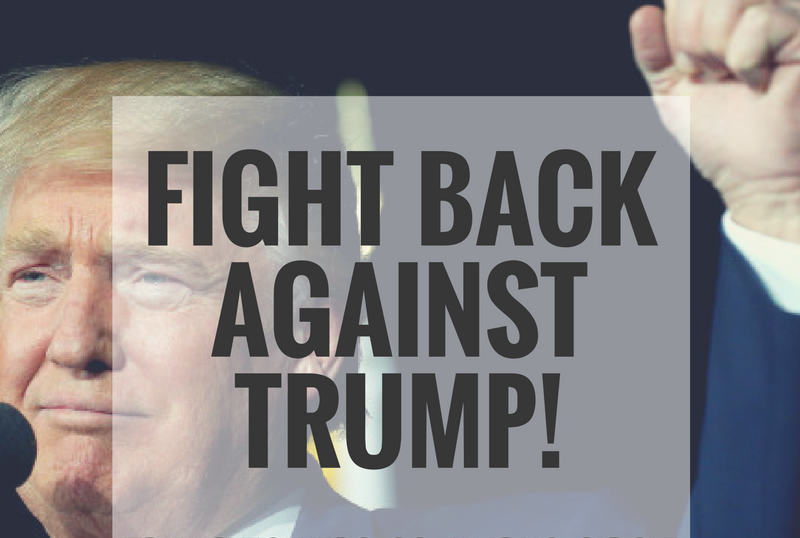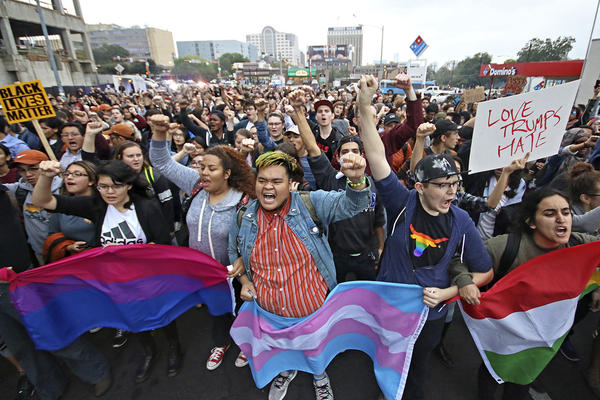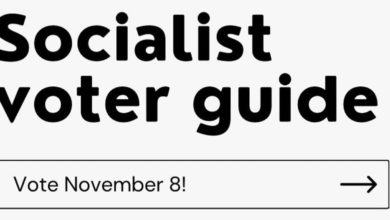Read the full interview at The Establishment.
Meet Gloria La Riva, the presidential candidate for the Party for Socialism and Liberation.
Gloria La Riva is a labor, community, and anti-war activist based in San Francisco; she’s built her platform, career, and worldview upon the eradication of U.S. wars and occupation, the prosecution of police who “abuse and kill,” the expungement of student debt, and advocacy for free health care; her current stance echoes her longtime platform of egalitarianism, which she also ran on when she vied for mayor of San Francisco in 1983, governor of California in 1994, and president for the first time in 2008.
She also writes regularly for Liberation News, taking aim at everything from the prison-industrial complex to environmental racism, all the while championing abortion access, reparations for Black Americans, economic justice, and addiction recovery.
In short? La Riva is striving for The People—writ large—regardless of class, gender, of race; in La Riva’s country, the playing field would not only be level, but symbiotic, benefiting all individuals to an equal degree.
The Establishment talked to Gloria about the dangerous myths accompanying capitalism, socialism, and the evolution of social revolutions in America.
Let’s start at the beginning. When and why did your activism—political and otherwise—begin?
It began when I was in college. I was always interested in politics, but I believed in capitalism as a child, growing up under the capitalist system. I’m from a working class, Mexican family in the U.S. My mother is from Mexico. My dad is Mexican-American and grew up in New Mexico.
I did well in high school, but I didn’t have the money to go to college. A young woman came to my school my senior year and told me to apply to [Brandeis] University. She said there’s money there, so I applied and got a scholarship.
When I got to Brandeis, the young students explained affirmative action to me. The school had been taken over and occupied by Black and Latino students in 1968. [I was there] in the wake of radical activism on many campuses. The school won these major demands of affirmative action to make sure youths of color, and white disadvantaged youths, have the freedom to attend school. That was my first lesson in the idea of collective action for change.
I became active on campus, including being involved with two building takeovers to defend affirmative action. In the course of a year, my fellow students and classes radicalized me. By the end of my first year, I decided I needed to become a socialist.
You co-founded the Party for Socialism and Liberation in 2004. Can you tell me more about what drove that decision?
A lot of us were activists in the [socialist] movement for years and decided this was the best time to form a new party—in the time of George Bush’s second run and the wars. We believed it was time for socialism.
Since then, the economic situation, financial crisis, the [housing] crash in 2008, wars and occupations, the Occupy movement, Black Lives Matter, and Fight for $15 [have made people] much more interested in socialism. This year is a very opportune time to be fighting for socialism. Everyone is focused on the election and has seen the disaster of the Democratic and Republican candidates.
How do you respond to someone that asks you, “just what is socialism?”
Socialism is the system whereby all the means of production—the machinery, factories, land, all the wealth that makes wealth—would be owned in common. Everything that’s produced is shared and distributed, rather than [made into] profits for a handful of corporations and companies.
That wealth would be used for social progress, medicine, health care, education, housing—everything people need from birth to death, like funerals, without a price tag. People can have real freedom without being separated by competition. Scientists, inventors, and doctors can work together, instead of producing for patents and controlling developments.
What are the most common misconceptions about socialism?
Many people don’t actually know what [socialism] is. Some have a general idea about the health care and education rights. When you grow up under capitalism, you hear myths. “Oh, there’s no incentive for people under socialism to invent things or improve their economic situation.” Of course, the capitalist has no incentive to produce and provide for society if it doesn’t make a profit.
But people, [including] the workers, do have incentive to live, eat, have a roof over their heads, and provide for children. History has shown working-class people are very motivated to fight for their freedoms, whether it’s African-Americans under Jim Crow racism, women fighting for equality, or even scientists innovating to improve society. People have always strived to help each other out.
Capitalism, which was once progressive, has now become an extreme impediment on progress. Employment is not the concern of the capitalist if you can’t make a profit off it. Medical care for people is threatened when you have corporations—like those run by Martin Shkreli [the entrepreneur and pharma executive currently being investigated]—whose only incentive to produce a pill is a super-profit.
Why is the current political climate of the 2016 election driving people to vote third party?
A very natural, common response before was, “I can’t waste my vote.” People approach us and say, “I like what you say, but my vote won’t count. It’s a waste.” You don’t find people saying that so much anymore. People now say they won’t waste their vote on Trump or Clinton; they feel much more confident in the idea of voting for a principle. It’s an astounding turnaround this year.
Many have seen the grotesque campaign of Trump, his endless media coverage and his racist and Islamophobic politics—the encouragement of fascist groups. People are terrified, but also wary of Clinton’s continued persistence of not revealing what she’d told Goldman Sachs and other banks, her accumulated wealth through the Clinton Foundation, and her history as a war monger. Only 9% of the population voted for either [Trump or Clinton] in the primaries, which shows the tiny minority who even felt invested enough to vote for them.
[The Party for Socialism and Liberation] considers the rights of the estimated 9 million undocumented people and the 15 million people who are not citizens (but are permanent residents) that cannot vote. My mother is a permanent resident and has lived in the U.S. for 65 years with a green card, but she’s never had a vote, because she’s never been a citizen. If you add to that figure those in prison, and those that have served—that’s about 31 million people completely disenfranchised from the political process without rights.I just returned from Standing Rock, North Dakota and that’s a great display of power against big oil. People are paying attention and coming from all over the country to join them. All these movements—Native Americans, environmental, youth on every front, anti-racism, anti-police brutality, right to education, working class demanding a livable wage, reproductive and abortion rights, health care, women’s equality, anti-discrimination for the LGBT community—are looking at each other, because they’re all together.
What led you to advocate for reparations with interest for Black Americans, and what’s your argument to people who oppose them?
The opposition to reparations is [rooted in] a lack of knowledge about the legacy of slavery and how much of the terror, theft of wealth, and denial of opportunity that still exists today causes the [Black] community in many cities to remain poor.
The Black population has far less personal wealth compared to white families or any other community. It has to do with racism—which is deeply embedded into our society—not always among the people, but there is a lot of white supremacy. [It also exists] among the capitalists and politicians who have done everything they can in ways that are not necessarily so obvious—but are rooted in the denial of rights to Black people.
There’s a lack of knowledge of Black history. Black History Month is so important and it needs to be year round and delve much deeper.
Look at Woodrow Wilson. I love the students that fought to try to remove this glorifying image of him at Princeton. As President, he ordered the mass removal of Black workers all across government jobs. He was an extreme white supremacist.
Jim Crow laws were the legacy of the counter-revolution: the turning back of the reforms after the Civil War, the Black codes that created peonage and re-enslaved people in another form with prisons. Prisons are filled with Black and Latino people. That’s a direct result of the same racist notion that Black people are criminals, that they should be give a harsher sentence than a white person for the exact same crime.
You’ve been a longtime supporter of same-sex marriage. How does this advocacy manifest itself in transgender rights?
Transgender people face social discrimination—one of the biggest issues being employment. I call for federal law to prohibit discrimination in housing, employment, education, and social access like bathrooms. They need federal protection.
In terms of the whole LGBTQ community, we’ve had great progress, brought about each time by social movements. It was not a vanguard leadership by politicians in any way, shape, or form. Now Hillary Clinton, for example, says she’s for LGBT rights and equal marriage, but she was opposed to it before and supported [Bill] Clinton’s DOMA. That’s proof of how the movement is what makes the change.
There’s also a need for education in the medical field about special health care for transgender people.
You support abortion—regardless of ability to pay—in addition to universal health care. However, reproductive rights activists are concerned about abortion access with the Hyde amendment still in place with Colorado’s health care proposal. How do you tackle both these issues simultaneously?
The [Hyde amendment] should be overturned. I think it’s astounding to see with all the gains the women’s movements made in the ’60s and ’70s, to see us being pushed back and having so many rights denied, whether it’s the Supreme Court ruling on Hobby Lobby or the “day after pill” being successfully defended. We need a women’s movement that includes everyone who wants to join in, not just women, [fighting] for women’s rights remaining independent of the political establishment. Similarly to the LGBT community, we can’t depend on politicians to defend our/their rights.
You’re running with Eugene Puryear nationally and Dennis Banks in California. Why two different candidates for vice president?
We’re happy to have two Vice Presidents. Eugene Puryear is under 35 years old. He cannot appear [on the ballot] in some states as a vice presidential candidate. He brings representation to our party. He has experience as a young African-American activist since high school, in the anti-racist and anti-police brutality struggles, and with student’s rights in Washington, DC.
Dennis Banks is a long-time leader in the Native struggle. We believe the Native struggle right now is of great importance on the questions of mining in Arizona, and the chemical spill in the Animas and San Juan rivers among the Navajo nation—any environmental struggles and economic issues among Native communities. He’s on the ballot in California, Iowa, New Mexico, and Colorado.

